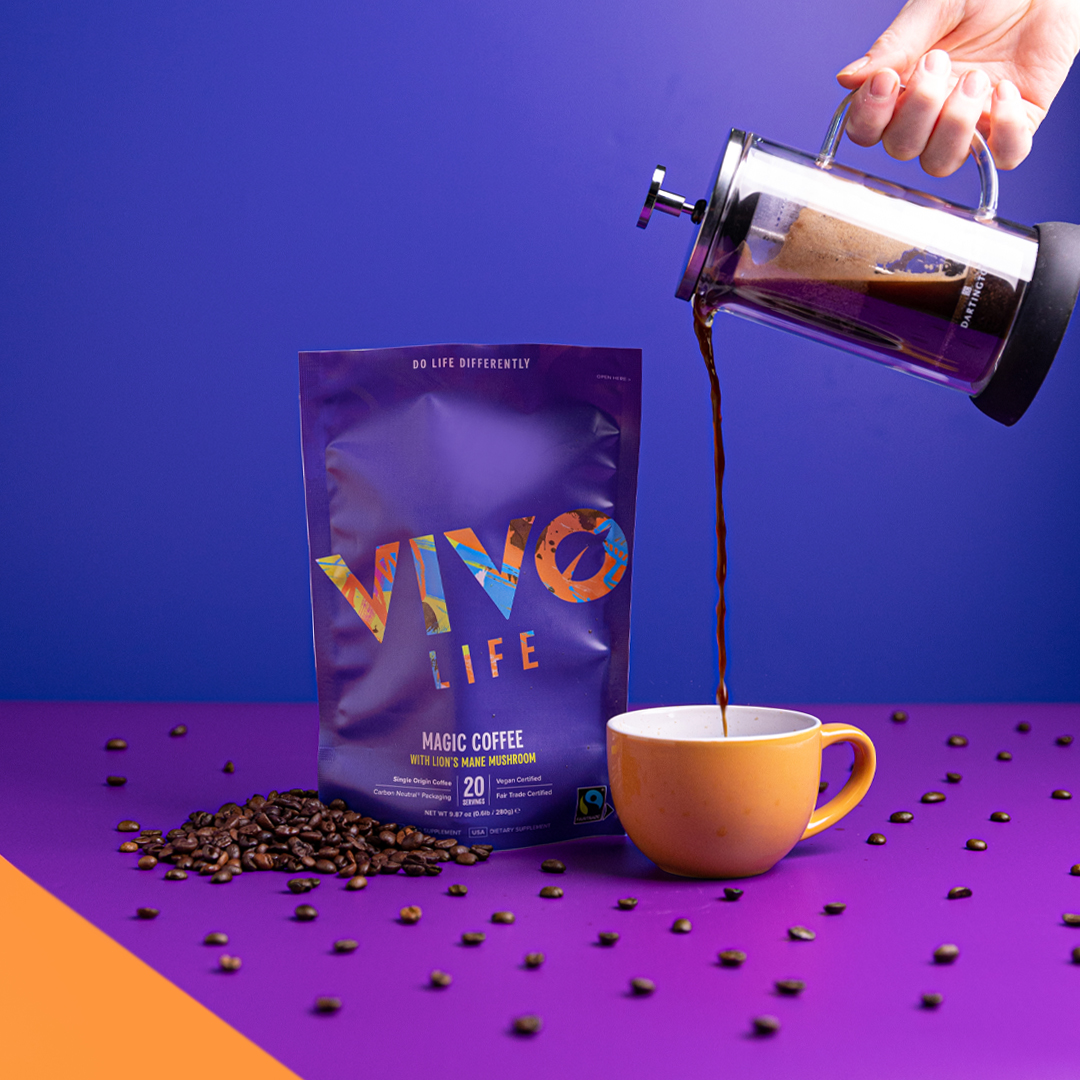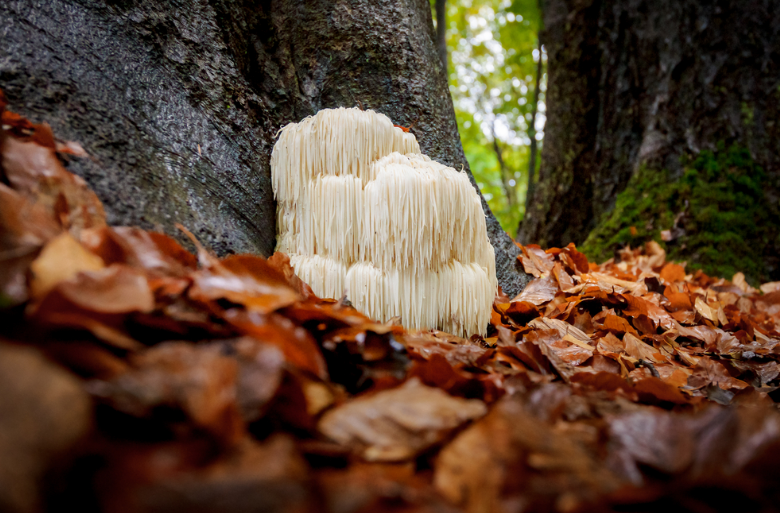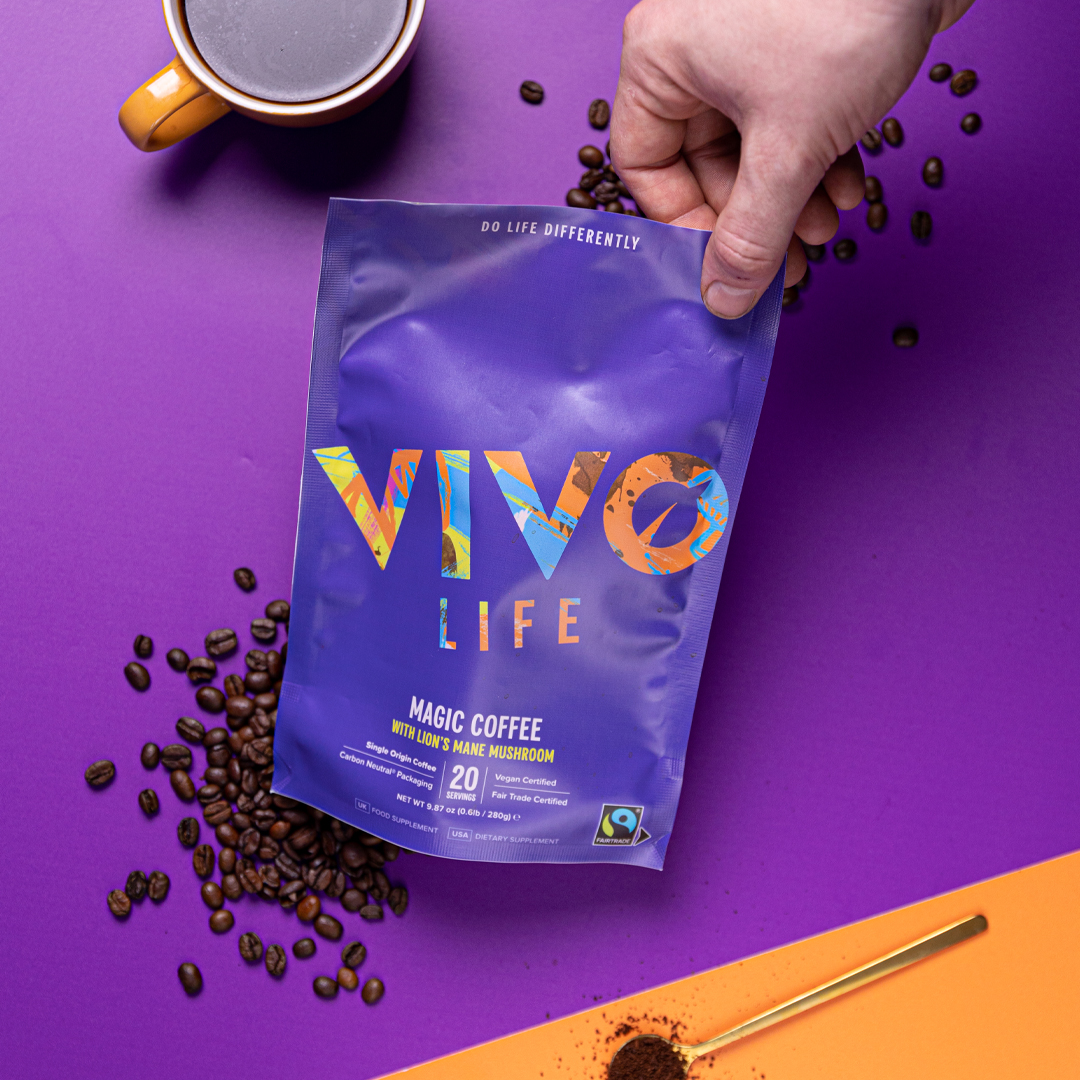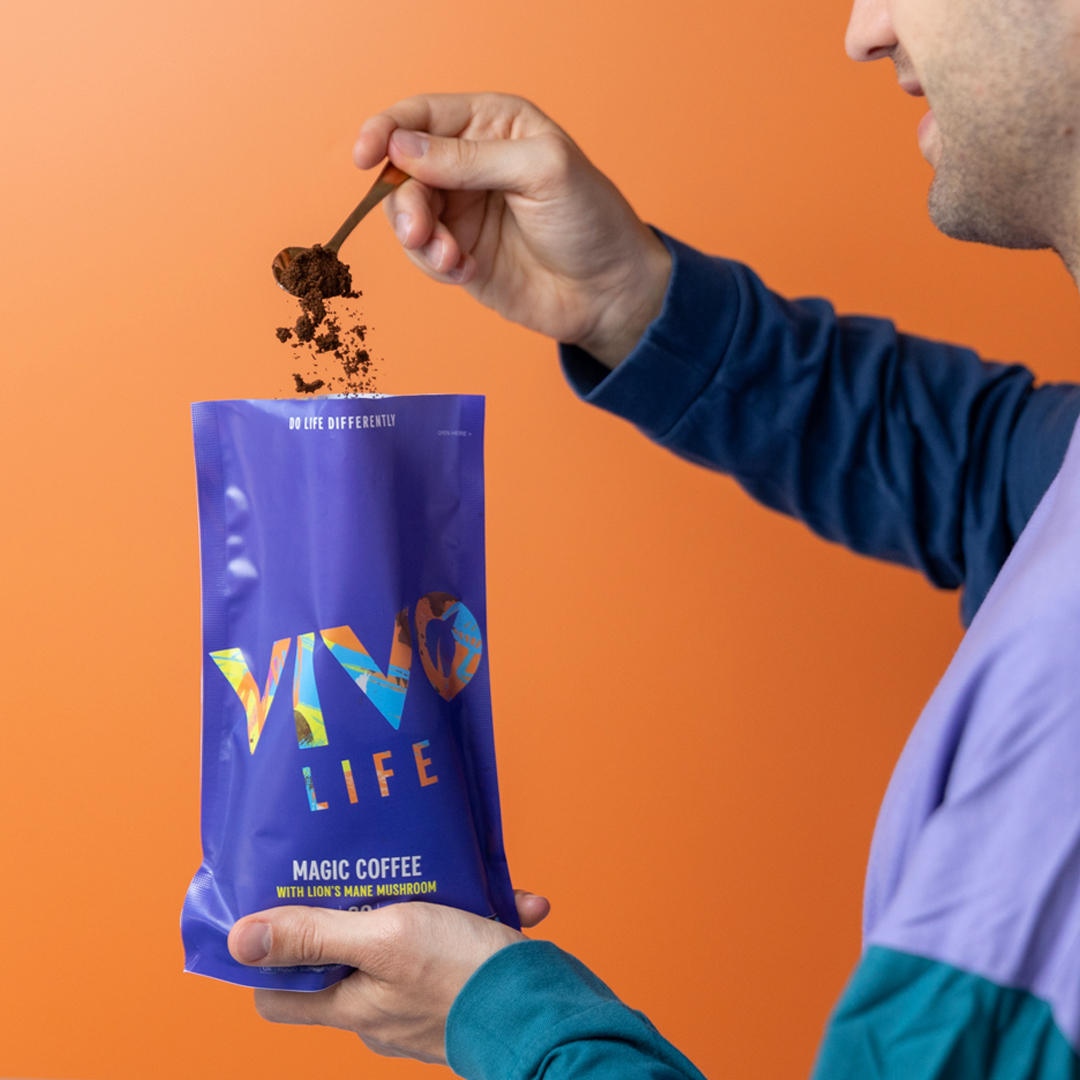MAGIC COFFEE
Updated
by Kat Hoyle
Our Magic coffee is the cousin of the Magic latte range. We wanted to create a blend that had all the energising effects of coffee with a nootropic, brain boosting addition of lion's mane medicinal mushroom.
Coffee is one of the most popular beverages consumed worldwide (second to water and teas) and it is either loved or vilified. Much of the negative associations of coffee come from poor farming and processing methods (often the case with lots of food substances), and over-use (especially of poor-quality coffee). The plant itself in fact contains a cocktail of nutraceutical compounds with many healthful benefits.
Our Arabica coffee is grown in the Lekempt region of Ethiopia at high altitudes at a family-owned co-operative. Mindful farming practices mitigate most of the risk for pollutants that are often found in mass produced coffees. We test our coffee for heavy metals (as with all our products) as standard.

Coffee as a supplement
Coffee of course contains caffeine, and with a single espresso containing around 70 mcg of caffeine (varies depending on the type of coffee/brewing method) one can expect to experience stimulative effects. Quality coffee is more than just a stimulant and has many healthful compounds meaning coffee can be considered an effective supplement to enhance physical and mental performance when consumed mindfully, due to caffeine having a synergetic reaction to adrenaline and noradrenaline. Coffee can be a cleaner alternative to a pre-workout, as most pre-workouts will contain a caffeine source.
A recent study by the International Study of Sports Nutrition stated that caffeine when consumed at appropriate dosages (around 3-6mg/kg body weight) had positive effects on muscular endurance, movement velocity, muscular strength, sprint, jump and throwing performance, as well as a range of aerobic and anaerobic sporting actions. Aerobic performance is believed to benefit the most from caffeine consumption. High doses of caffeine (around 9mg/kg body weight) were not associated with better performance. It is these higher doses that have links to negative affects of caffeine consumption. They concurred that caffeine consumption showed benefits to cognitive function, attention, and vigilance.
As well as energising effects, caffeine has also been shown to have anti-oxidative and anti-inflammatory properties. Caffeine is believed to have neuroprotective properties, as well as supporting liver health, cardiovascular health, and metabolic health, when consumed at appropriate levels.
The second most abundant bioactive compound in coffee is Trigonelline, which is believed to have a wide range of pharmacological benefits including anti-hyperglycemic (counteracts accumulation of excess sugar in the blood), anti-hyperlipidemic (prevents build up of lipids in the blood), anti-bacterial, anti-viral and anti-tumorous. There are also preliminary studies exploring trigonelline for potential neuroprotective benefits.
Chlorogenic is another bioactive compound found in coffee with the potential to exert anti-inflammatory, hepatoprotective (supports liver health), cardioprotective (supports a health cardio -vascular system), anti-diabetic, neuroprotective and metabolism supporting benefits. Chlorogenic acid is believed to help buffer oxidative stress and express free radical scavenging activity.
The safe upper tolerable limit of coffee consumption is not strictly outlined, as individuals of course tolerate coffee differently, largely due to dietary factors, fitness levels, some genetic factors, hormonal health to name a few. There are some negative associations with extreme overuse, and more so with lesser quality coffees, and these are not to be overlooked. Extreme coffee use should be avoided, and a good guideline to stick to is no more than 3 cups of quality coffee per day. If you are interested in learning more about your own caffeine intake in relation to any health concerns you may have, a nutritionist or your doctor should be able to offer guidance.
The Mushroom!

Lion's Mane mushroom takes center stage in our magic coffee. We use Lion's Mane fruiting body (30% polysaccharides) sustainably sourced from their natural habitat in China. It is a celebrated nootropic, meaning it has a positive effect on the human brain, and therefore cognition, focus and so on. Lions Mane has been shown to promote neurogenesis, that is the strengthening of existing neural pathways, and the creation of new ones. This effect is believed to be because Lion's Mane has been shown to increase mRNA expression of nerve-growth factor. Neural excitability also appears to be attenuated in the presence of Lion's Mane, and Lion's Mane has also been shown to enhance myelination (production of myelin sheath, the protective casing around neurons). Animal studies have shown improvements in cognition and focus when consuming Lion's Mane, and one human study explored the relationship between Lion's Mane and dementia, observing that supplementation improved cognition in subjects relative to control, and the benefits improved over time while supplementation continued. Lion's Mane also shares the general health benefits of the other medicinal mushrooms, including antioxidant, anti-inflammatory, anti-bacterial, anti-fungal and so on.
The adaptogenic properties of the Lion's Mane mushroom seem to have a calming effect on the usually caffeine associated energy “spike and crash”. Meaning you may experience a smoother energy lift for a more sustained duration, without the crash. You can read more about adaptogens and their affect on the body here.
How to best use our Magic Coffee.
The pairing of Lion's Mane mushroom with is nootropic benefits, with our Arabica coffee and its mental and physical stimulating effects makes for a perfect morning beverage to prepare you for a day of physical and/or mental focus. It is recommended that water should always be drunk close to having a caffeinated drink, so to minimise stress on the adrenals and to keep the body hydrated. One large glass of water per caffeinated drink is a good guideline. Making sure the body is well hydrated with clean water upon waking, before having any caffeinated drinks is also highly recommended.
Our Magic coffee can also make a great alternative to a pre-workout supplement. Having a mushroom coffee in the hour before you train could lead to an energised and focused state. It is particularly important in this instance to drink a lot of water as well, as water loss is more prevalent when exercising.
Our coffee is a course grind which is best suited to brewing in a French press.
Coffee can have a negative affect on nutrient absorption due to the polyphenol content. With this in mind it is recommended to not have coffee with a meal, and to space 30 minutes to an hour between a cup of coffee and your meals.
Any of the potential negative associations with over coffee consumption are particularly exacerbated in individuals who smoke tobacco regularly. The bioactive compounds found in coffee when consumed can pass through to all bodily fluids including the blood, urine, breast milk, etc. It is therefore recommended that breast feeding women consult their health care provider regarding coffee consumption. Pregnant women are advised to avoid coffee consumption.
How to use
Our coffee is best brewed in a French press. Once brewed there are many ways to enjoy it! Simply black, or top with warmed frothy plant milk. You could allow to cool and make a refreshing iced coffee, or even add coffee to your protein shakes!
If you are caffeine sensitive its advisable to have your coffees in the morning/early afternoon, to minimise the effect on quality of sleep.

Frequently Asked Questions.
- Where is your coffee sourced?
Our coffee beans are grown at high altitudes in the Lekempt region of Ethiopia, known locally as ‘the birthplace of coffee.’ The beans are hand harvested, sun dried, and then roasted and ground in small batches at our roastery in Bristol, UK.
- How does Mushroom Coffee compare to regular coffee?
Magic Mushroom Coffee combines the energising properties of coffee with the brain boosting benefits of Lion’s Mane Mushroom to support mental and physical sharpness. Expect longer lasting energy and greater mental clarity when using Magic Mushroom Coffee. It is also tested for mycotoxins to guarantee the cleanest and healthiest coffee.
- How much caffeine is in each serving?
Each 14g serving contains around 110-195mg caffeine. Caffeine content may vary depending on how you choose to brew it.
- How many mushrooms can I take in a day? Can I combine mushrooms?
We recommend beginning with 1 serving per day of any of our Magic products, so you can get a feel for how each mushroom affects your body. You can combine mushrooms once you have gauged the magnitude of effect they have on you.
- Does it taste like mushrooms?
Don’t worry! Magic Mushroom Coffee doesn’t taste like mushrooms. It has a rich, smooth flavour that is just as delicious as your favourite coffee.
- What mycotoxins do you test for?
Our coffee is tested for mycotoxins including Ochratoxin A, Aflatoxin B1, B2, G1, G2, Total Aflatoxins and Aflatoxin M1.
- Can I use a drip filter (percolator) or a stove top/moka pot to brew it?
Yes, you can use both of these methods to brew coffee. We recommend the French press to give maximum benefits from the coffee and mushrooms.

References
E V Kolotushkina, M G Moldavan, K Yu Voronin, G G Skibo. (2003). The influence of Hericium erinaceus extract on myelination process in vitro. Fizoil Zh.. 49 (1), 38-45.
Karen Nieber . (2017). The Impact of Coffee on Health. Planta Medica. 83 (16), 1256-1263.
Koichiro Mori, Satoshi Inatomi, Kenzi Ouchi, Yoshihito Azumi, Takashi Tuchida. (2009). Improving effects of the mushroom Yamabushitake (Hericium erinaceus) on mild cognitive impairment: a double-blind placebo-controlled clinical trial. Phytotherapy Research. 23 (3), 367-372.
Koichiro Mori, Yutaro Obara, Mitsuru Hirota, Yoshihito Azumi, Satomi Kinugasa, Satoshi Inatomi, Norimichi Nakahata. (2008). Nerve growth factor-inducing activity of Hericium erinaceus in 1321N1 human astrocytoma cells. Biological & Pharmaceutical Bulletin. 31 (9), 1727-1732.
Mafalda C. Sarraguca, Ricardo N.M.J. Pascoa, Miguel Lopo, Jorge M.G. Sarraguca, Joao A. Lopes. (2016). Bioactive Compounds in Coffee as Health Promotors. Natural Bioactive Compounds from Fruits and Vegetables as Health Promoters. 2 (41), 180-220.
Mahshad Kolahdouzan, Mazen J Hamadeh. (2017). The neuroprotective effects of caffeine in neurodegenerative diseases. CNS Neuroscience and Therapeutics. 223 (4), 272-290.
Nanci S Guest, Trisha A VanDusseldorp, Michael T Nelson, Jozo Grgic, Brad J Schoenfeld, Nathaniel D M Jenkins, Shawn M Arent, Jose Antonio, Jeffrey R Stout, Eric T Trexler,. (2021). International society of sports nutrition position stand: caffeine and exercise performance. Journal of the International Society of Sports Nutrition. 18 (1), 145-151.
Robin Poole, Oliver J Kennedy, Paul Roderick, Jonathan A Fallowfield , Peter C Hayes , Julie Parkes. (2017). Coffee consumption and health: umbrella review of meta-analyses of multiple health outcomes. BMJ (Clinical research ed). 359 (1), 1134-48.
Solomon P. Wasser. (2007). Neurotropic and Trophic Action of Lion's Mane Mushroom Hericium erinaceus (Bull.: Fr.) Pers. (Aphyllophoromycetideae) Extracts on Nerve Cells in Vitro. International Journal of Medicinal Mushrooms. 1 (1), 15-28.
